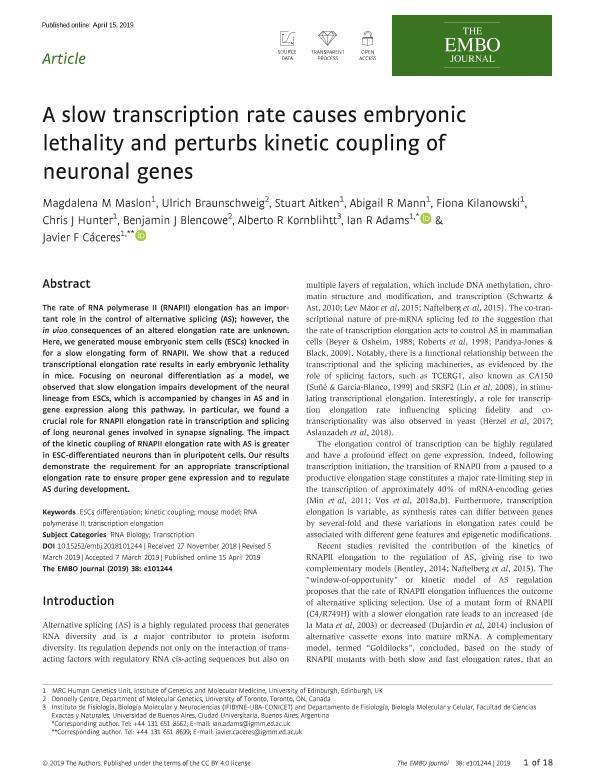Artículo
A slow transcription rate causes embryonic lethality and perturbs kinetic coupling of neuronal genes
Maslon, M.; Braunschweig, U.; Aitken, S.; Mann, A.R.; Kilanowski, F.; Hunter, C.H.; Blencowe, B.J.; Kornblihtt, Alberto Rodolfo ; Adams, I.; Cáceres, J.F.
; Adams, I.; Cáceres, J.F.
 ; Adams, I.; Cáceres, J.F.
; Adams, I.; Cáceres, J.F.
Fecha de publicación:
04/2019
Editorial:
Nature Publishing Group
Revista:
Embo Journal
ISSN:
0261-4189
Idioma:
Inglés
Tipo de recurso:
Artículo publicado
Clasificación temática:
Resumen
The rate of RNA polymerase II (RNAPII) elongation has an important role in the control of alternative splicing (AS); however, the in vivo consequences of an altered elongation rate are unknown. Here, we generated mouse embryonic stem cells (ESCs) knocked in for a slow elongating form of RNAPII. We show that a reduced transcriptional elongation rate results in early embryonic lethality in mice. Focusing on neuronal differentiation as a model, we observed that slow elongation impairs development of the neural lineage from ESCs, which is accompanied by changes in AS and in gene expression along this pathway. In particular, we found a crucial role for RNAPII elongation rate in transcription and splicing of long neuronal genes involved in synapse signaling. The impact of the kinetic coupling of RNAPII elongation rate with AS is greater in ESC-differentiated neurons than in pluripotent cells. Our results demonstrate the requirement for an appropriate transcriptional elongation rate to ensure proper gene expression and to regulate AS during development.
Archivos asociados
Licencia
Identificadores
Colecciones
Articulos(IFIBYNE)
Articulos de INST.DE FISIOL., BIOL.MOLECULAR Y NEUROCIENCIAS
Articulos de INST.DE FISIOL., BIOL.MOLECULAR Y NEUROCIENCIAS
Citación
Maslon, M.; Braunschweig, U.; Aitken, S.; Mann, A.R.; Kilanowski, F.; et al.; A slow transcription rate causes embryonic lethality and perturbs kinetic coupling of neuronal genes; Nature Publishing Group; Embo Journal; 38; 9; 4-2019; 1-18
Compartir
Altmétricas



